Mental Health Nursing: Applying Stress Vulnerability Model to Chung
VerifiedAdded on 2023/06/08
|8
|2442
|297
Case Study
AI Summary
This assignment presents a detailed analysis of Chung, a 35-year-old male doctor experiencing mental health issues, using a case study approach. It begins by assessing Chung's mental health status based on a mental state examination and DSM-5 criteria, identifying symptoms of depression and anxiety linked to work stress, family pressures, and health concerns. The analysis then explores contributing factors using the stress vulnerability model, highlighting the impact of work-related stress, a new baby, and his wife's health condition. Finally, the assignment discusses the application of recovery-oriented practices, emphasizing respect, empowerment, and hope to facilitate Chung's recovery, improve his well-being, and address suicidal thoughts. The study references academic sources to support its findings and recommendations.
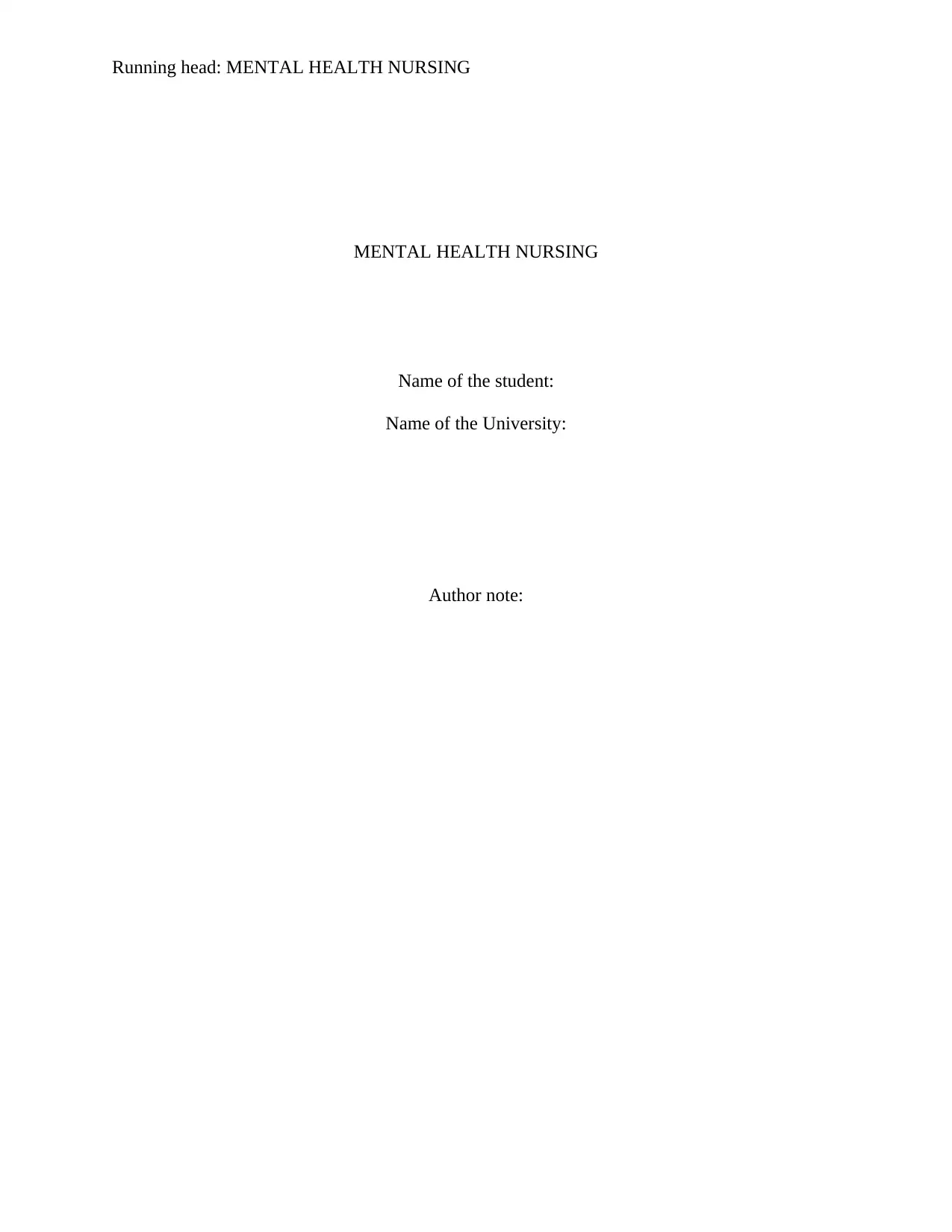
Running head: MENTAL HEALTH NURSING
MENTAL HEALTH NURSING
Name of the student:
Name of the University:
Author note:
MENTAL HEALTH NURSING
Name of the student:
Name of the University:
Author note:
Paraphrase This Document
Need a fresh take? Get an instant paraphrase of this document with our AI Paraphraser
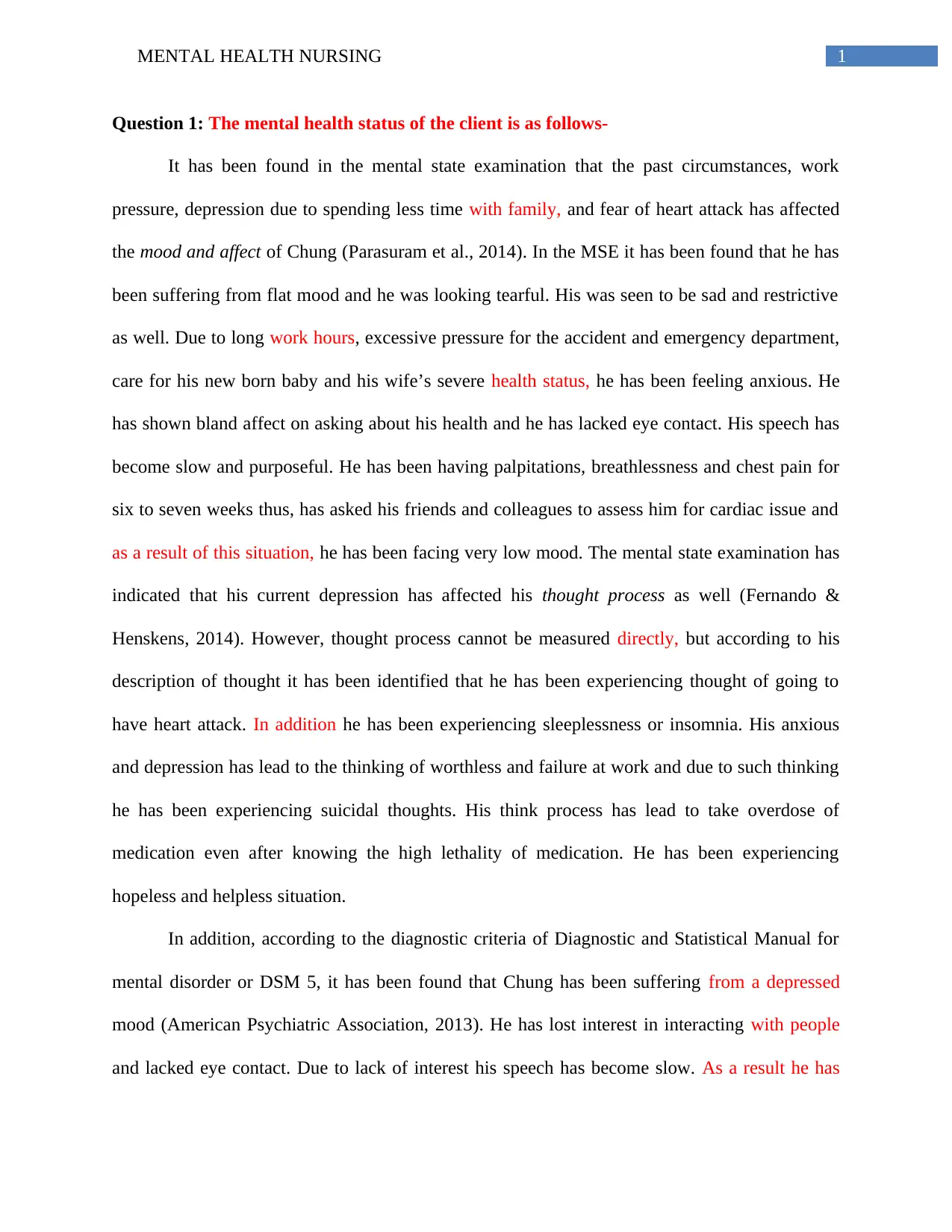
1MENTAL HEALTH NURSING
Question 1: The mental health status of the client is as follows-
It has been found in the mental state examination that the past circumstances, work
pressure, depression due to spending less time with family, and fear of heart attack has affected
the mood and affect of Chung (Parasuram et al., 2014). In the MSE it has been found that he has
been suffering from flat mood and he was looking tearful. His was seen to be sad and restrictive
as well. Due to long work hours, excessive pressure for the accident and emergency department,
care for his new born baby and his wife’s severe health status, he has been feeling anxious. He
has shown bland affect on asking about his health and he has lacked eye contact. His speech has
become slow and purposeful. He has been having palpitations, breathlessness and chest pain for
six to seven weeks thus, has asked his friends and colleagues to assess him for cardiac issue and
as a result of this situation, he has been facing very low mood. The mental state examination has
indicated that his current depression has affected his thought process as well (Fernando &
Henskens, 2014). However, thought process cannot be measured directly, but according to his
description of thought it has been identified that he has been experiencing thought of going to
have heart attack. In addition he has been experiencing sleeplessness or insomnia. His anxious
and depression has lead to the thinking of worthless and failure at work and due to such thinking
he has been experiencing suicidal thoughts. His think process has lead to take overdose of
medication even after knowing the high lethality of medication. He has been experiencing
hopeless and helpless situation.
In addition, according to the diagnostic criteria of Diagnostic and Statistical Manual for
mental disorder or DSM 5, it has been found that Chung has been suffering from a depressed
mood (American Psychiatric Association, 2013). He has lost interest in interacting with people
and lacked eye contact. Due to lack of interest his speech has become slow. As a result he has
Question 1: The mental health status of the client is as follows-
It has been found in the mental state examination that the past circumstances, work
pressure, depression due to spending less time with family, and fear of heart attack has affected
the mood and affect of Chung (Parasuram et al., 2014). In the MSE it has been found that he has
been suffering from flat mood and he was looking tearful. His was seen to be sad and restrictive
as well. Due to long work hours, excessive pressure for the accident and emergency department,
care for his new born baby and his wife’s severe health status, he has been feeling anxious. He
has shown bland affect on asking about his health and he has lacked eye contact. His speech has
become slow and purposeful. He has been having palpitations, breathlessness and chest pain for
six to seven weeks thus, has asked his friends and colleagues to assess him for cardiac issue and
as a result of this situation, he has been facing very low mood. The mental state examination has
indicated that his current depression has affected his thought process as well (Fernando &
Henskens, 2014). However, thought process cannot be measured directly, but according to his
description of thought it has been identified that he has been experiencing thought of going to
have heart attack. In addition he has been experiencing sleeplessness or insomnia. His anxious
and depression has lead to the thinking of worthless and failure at work and due to such thinking
he has been experiencing suicidal thoughts. His think process has lead to take overdose of
medication even after knowing the high lethality of medication. He has been experiencing
hopeless and helpless situation.
In addition, according to the diagnostic criteria of Diagnostic and Statistical Manual for
mental disorder or DSM 5, it has been found that Chung has been suffering from a depressed
mood (American Psychiatric Association, 2013). He has lost interest in interacting with people
and lacked eye contact. Due to lack of interest his speech has become slow. As a result he has
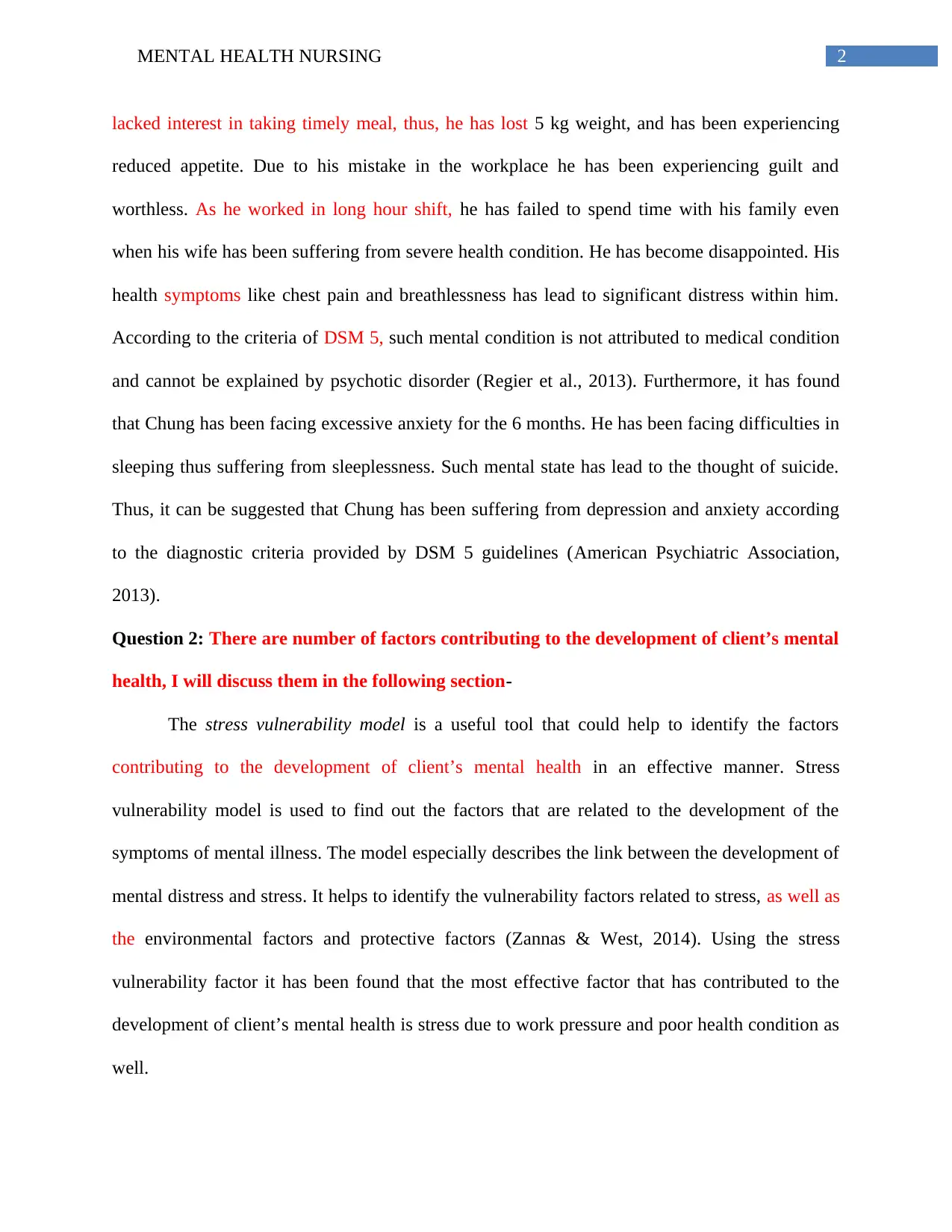
2MENTAL HEALTH NURSING
lacked interest in taking timely meal, thus, he has lost 5 kg weight, and has been experiencing
reduced appetite. Due to his mistake in the workplace he has been experiencing guilt and
worthless. As he worked in long hour shift, he has failed to spend time with his family even
when his wife has been suffering from severe health condition. He has become disappointed. His
health symptoms like chest pain and breathlessness has lead to significant distress within him.
According to the criteria of DSM 5, such mental condition is not attributed to medical condition
and cannot be explained by psychotic disorder (Regier et al., 2013). Furthermore, it has found
that Chung has been facing excessive anxiety for the 6 months. He has been facing difficulties in
sleeping thus suffering from sleeplessness. Such mental state has lead to the thought of suicide.
Thus, it can be suggested that Chung has been suffering from depression and anxiety according
to the diagnostic criteria provided by DSM 5 guidelines (American Psychiatric Association,
2013).
Question 2: There are number of factors contributing to the development of client’s mental
health, I will discuss them in the following section-
The stress vulnerability model is a useful tool that could help to identify the factors
contributing to the development of client’s mental health in an effective manner. Stress
vulnerability model is used to find out the factors that are related to the development of the
symptoms of mental illness. The model especially describes the link between the development of
mental distress and stress. It helps to identify the vulnerability factors related to stress, as well as
the environmental factors and protective factors (Zannas & West, 2014). Using the stress
vulnerability factor it has been found that the most effective factor that has contributed to the
development of client’s mental health is stress due to work pressure and poor health condition as
well.
lacked interest in taking timely meal, thus, he has lost 5 kg weight, and has been experiencing
reduced appetite. Due to his mistake in the workplace he has been experiencing guilt and
worthless. As he worked in long hour shift, he has failed to spend time with his family even
when his wife has been suffering from severe health condition. He has become disappointed. His
health symptoms like chest pain and breathlessness has lead to significant distress within him.
According to the criteria of DSM 5, such mental condition is not attributed to medical condition
and cannot be explained by psychotic disorder (Regier et al., 2013). Furthermore, it has found
that Chung has been facing excessive anxiety for the 6 months. He has been facing difficulties in
sleeping thus suffering from sleeplessness. Such mental state has lead to the thought of suicide.
Thus, it can be suggested that Chung has been suffering from depression and anxiety according
to the diagnostic criteria provided by DSM 5 guidelines (American Psychiatric Association,
2013).
Question 2: There are number of factors contributing to the development of client’s mental
health, I will discuss them in the following section-
The stress vulnerability model is a useful tool that could help to identify the factors
contributing to the development of client’s mental health in an effective manner. Stress
vulnerability model is used to find out the factors that are related to the development of the
symptoms of mental illness. The model especially describes the link between the development of
mental distress and stress. It helps to identify the vulnerability factors related to stress, as well as
the environmental factors and protective factors (Zannas & West, 2014). Using the stress
vulnerability factor it has been found that the most effective factor that has contributed to the
development of client’s mental health is stress due to work pressure and poor health condition as
well.
⊘ This is a preview!⊘
Do you want full access?
Subscribe today to unlock all pages.

Trusted by 1+ million students worldwide
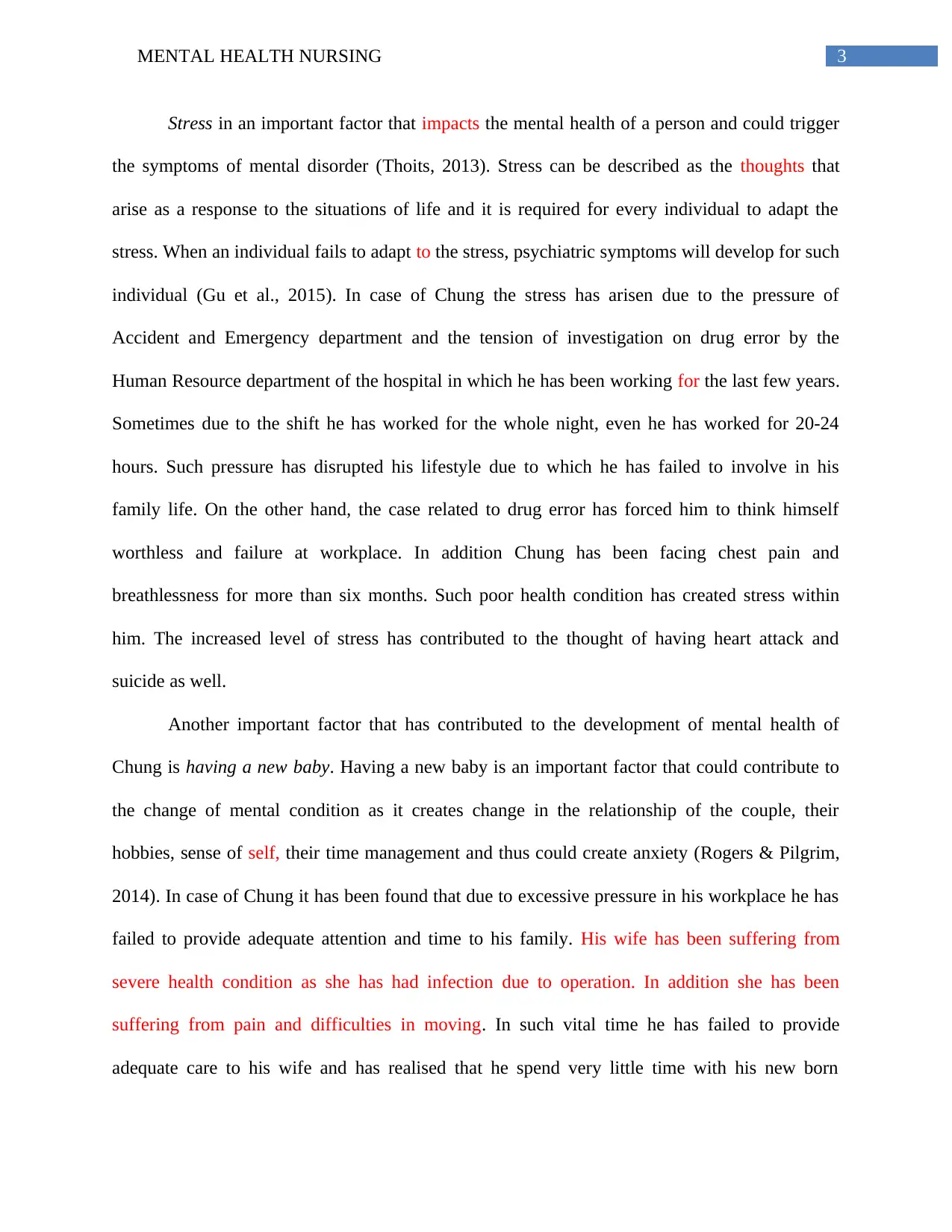
3MENTAL HEALTH NURSING
Stress in an important factor that impacts the mental health of a person and could trigger
the symptoms of mental disorder (Thoits, 2013). Stress can be described as the thoughts that
arise as a response to the situations of life and it is required for every individual to adapt the
stress. When an individual fails to adapt to the stress, psychiatric symptoms will develop for such
individual (Gu et al., 2015). In case of Chung the stress has arisen due to the pressure of
Accident and Emergency department and the tension of investigation on drug error by the
Human Resource department of the hospital in which he has been working for the last few years.
Sometimes due to the shift he has worked for the whole night, even he has worked for 20-24
hours. Such pressure has disrupted his lifestyle due to which he has failed to involve in his
family life. On the other hand, the case related to drug error has forced him to think himself
worthless and failure at workplace. In addition Chung has been facing chest pain and
breathlessness for more than six months. Such poor health condition has created stress within
him. The increased level of stress has contributed to the thought of having heart attack and
suicide as well.
Another important factor that has contributed to the development of mental health of
Chung is having a new baby. Having a new baby is an important factor that could contribute to
the change of mental condition as it creates change in the relationship of the couple, their
hobbies, sense of self, their time management and thus could create anxiety (Rogers & Pilgrim,
2014). In case of Chung it has been found that due to excessive pressure in his workplace he has
failed to provide adequate attention and time to his family. His wife has been suffering from
severe health condition as she has had infection due to operation. In addition she has been
suffering from pain and difficulties in moving. In such vital time he has failed to provide
adequate care to his wife and has realised that he spend very little time with his new born
Stress in an important factor that impacts the mental health of a person and could trigger
the symptoms of mental disorder (Thoits, 2013). Stress can be described as the thoughts that
arise as a response to the situations of life and it is required for every individual to adapt the
stress. When an individual fails to adapt to the stress, psychiatric symptoms will develop for such
individual (Gu et al., 2015). In case of Chung the stress has arisen due to the pressure of
Accident and Emergency department and the tension of investigation on drug error by the
Human Resource department of the hospital in which he has been working for the last few years.
Sometimes due to the shift he has worked for the whole night, even he has worked for 20-24
hours. Such pressure has disrupted his lifestyle due to which he has failed to involve in his
family life. On the other hand, the case related to drug error has forced him to think himself
worthless and failure at workplace. In addition Chung has been facing chest pain and
breathlessness for more than six months. Such poor health condition has created stress within
him. The increased level of stress has contributed to the thought of having heart attack and
suicide as well.
Another important factor that has contributed to the development of mental health of
Chung is having a new baby. Having a new baby is an important factor that could contribute to
the change of mental condition as it creates change in the relationship of the couple, their
hobbies, sense of self, their time management and thus could create anxiety (Rogers & Pilgrim,
2014). In case of Chung it has been found that due to excessive pressure in his workplace he has
failed to provide adequate attention and time to his family. His wife has been suffering from
severe health condition as she has had infection due to operation. In addition she has been
suffering from pain and difficulties in moving. In such vital time he has failed to provide
adequate care to his wife and has realised that he spend very little time with his new born
Paraphrase This Document
Need a fresh take? Get an instant paraphrase of this document with our AI Paraphraser
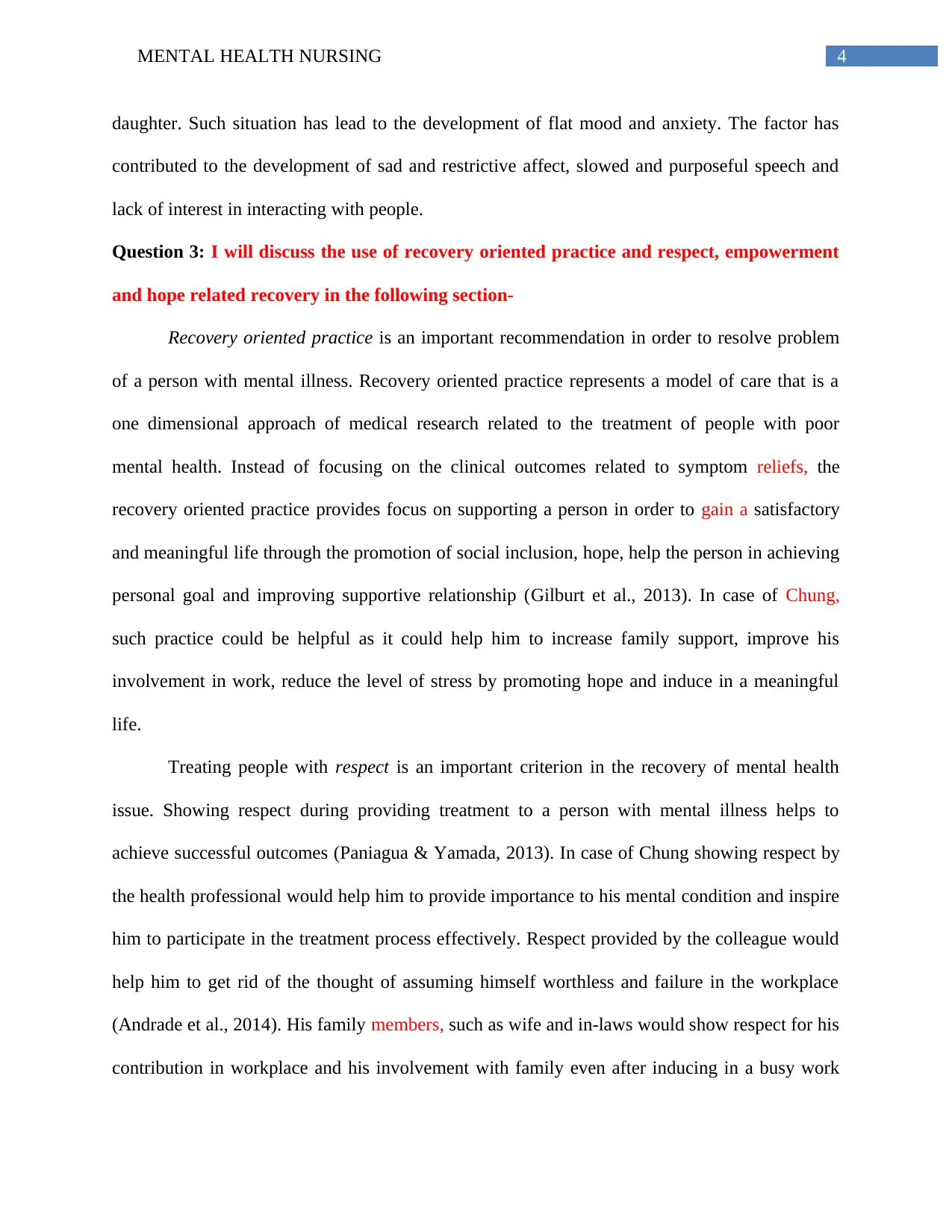
4MENTAL HEALTH NURSING
daughter. Such situation has lead to the development of flat mood and anxiety. The factor has
contributed to the development of sad and restrictive affect, slowed and purposeful speech and
lack of interest in interacting with people.
Question 3: I will discuss the use of recovery oriented practice and respect, empowerment
and hope related recovery in the following section-
Recovery oriented practice is an important recommendation in order to resolve problem
of a person with mental illness. Recovery oriented practice represents a model of care that is a
one dimensional approach of medical research related to the treatment of people with poor
mental health. Instead of focusing on the clinical outcomes related to symptom reliefs, the
recovery oriented practice provides focus on supporting a person in order to gain a satisfactory
and meaningful life through the promotion of social inclusion, hope, help the person in achieving
personal goal and improving supportive relationship (Gilburt et al., 2013). In case of Chung,
such practice could be helpful as it could help him to increase family support, improve his
involvement in work, reduce the level of stress by promoting hope and induce in a meaningful
life.
Treating people with respect is an important criterion in the recovery of mental health
issue. Showing respect during providing treatment to a person with mental illness helps to
achieve successful outcomes (Paniagua & Yamada, 2013). In case of Chung showing respect by
the health professional would help him to provide importance to his mental condition and inspire
him to participate in the treatment process effectively. Respect provided by the colleague would
help him to get rid of the thought of assuming himself worthless and failure in the workplace
(Andrade et al., 2014). His family members, such as wife and in-laws would show respect for his
contribution in workplace and his involvement with family even after inducing in a busy work
daughter. Such situation has lead to the development of flat mood and anxiety. The factor has
contributed to the development of sad and restrictive affect, slowed and purposeful speech and
lack of interest in interacting with people.
Question 3: I will discuss the use of recovery oriented practice and respect, empowerment
and hope related recovery in the following section-
Recovery oriented practice is an important recommendation in order to resolve problem
of a person with mental illness. Recovery oriented practice represents a model of care that is a
one dimensional approach of medical research related to the treatment of people with poor
mental health. Instead of focusing on the clinical outcomes related to symptom reliefs, the
recovery oriented practice provides focus on supporting a person in order to gain a satisfactory
and meaningful life through the promotion of social inclusion, hope, help the person in achieving
personal goal and improving supportive relationship (Gilburt et al., 2013). In case of Chung,
such practice could be helpful as it could help him to increase family support, improve his
involvement in work, reduce the level of stress by promoting hope and induce in a meaningful
life.
Treating people with respect is an important criterion in the recovery of mental health
issue. Showing respect during providing treatment to a person with mental illness helps to
achieve successful outcomes (Paniagua & Yamada, 2013). In case of Chung showing respect by
the health professional would help him to provide importance to his mental condition and inspire
him to participate in the treatment process effectively. Respect provided by the colleague would
help him to get rid of the thought of assuming himself worthless and failure in the workplace
(Andrade et al., 2014). His family members, such as wife and in-laws would show respect for his
contribution in workplace and his involvement with family even after inducing in a busy work
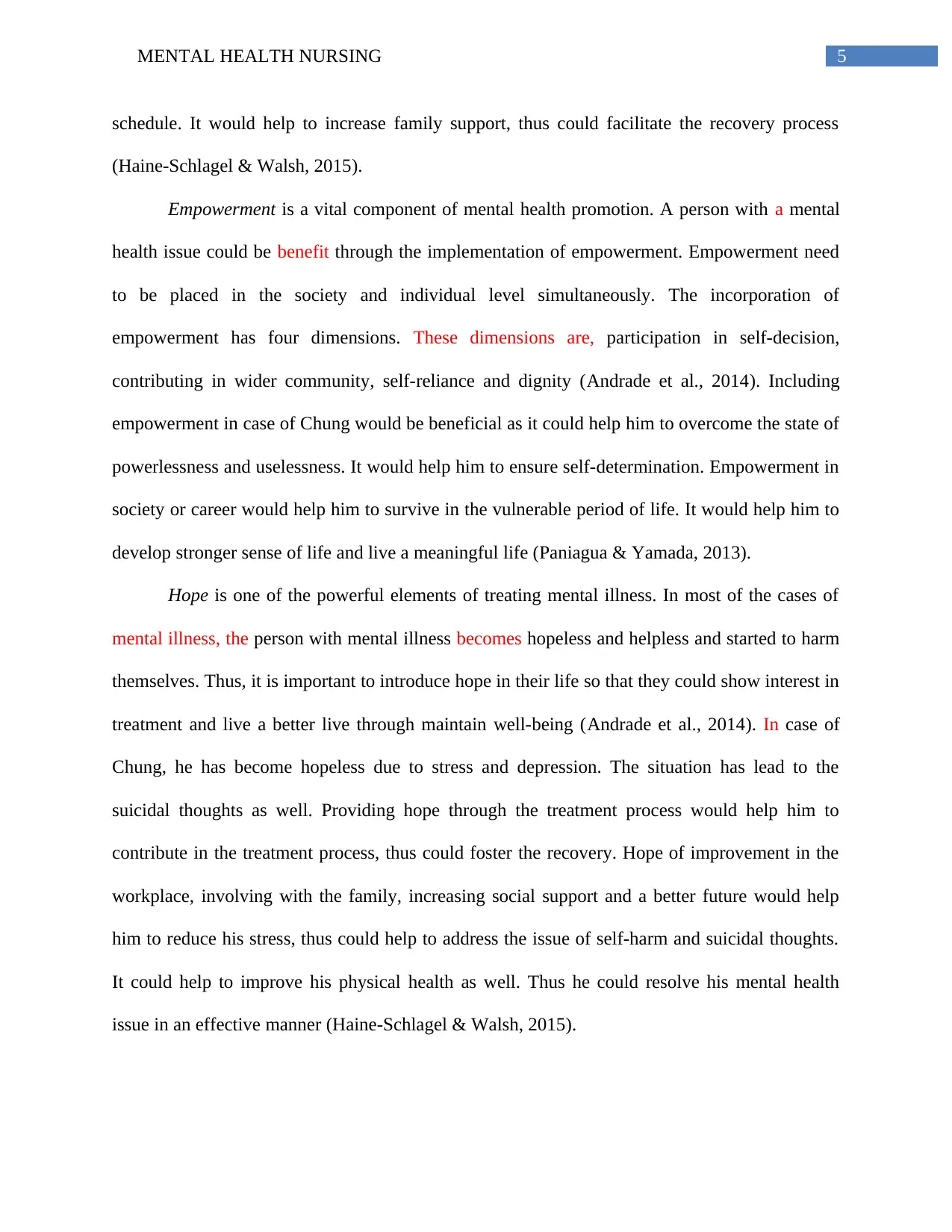
5MENTAL HEALTH NURSING
schedule. It would help to increase family support, thus could facilitate the recovery process
(Haine-Schlagel & Walsh, 2015).
Empowerment is a vital component of mental health promotion. A person with a mental
health issue could be benefit through the implementation of empowerment. Empowerment need
to be placed in the society and individual level simultaneously. The incorporation of
empowerment has four dimensions. These dimensions are, participation in self-decision,
contributing in wider community, self-reliance and dignity (Andrade et al., 2014). Including
empowerment in case of Chung would be beneficial as it could help him to overcome the state of
powerlessness and uselessness. It would help him to ensure self-determination. Empowerment in
society or career would help him to survive in the vulnerable period of life. It would help him to
develop stronger sense of life and live a meaningful life (Paniagua & Yamada, 2013).
Hope is one of the powerful elements of treating mental illness. In most of the cases of
mental illness, the person with mental illness becomes hopeless and helpless and started to harm
themselves. Thus, it is important to introduce hope in their life so that they could show interest in
treatment and live a better live through maintain well-being (Andrade et al., 2014). In case of
Chung, he has become hopeless due to stress and depression. The situation has lead to the
suicidal thoughts as well. Providing hope through the treatment process would help him to
contribute in the treatment process, thus could foster the recovery. Hope of improvement in the
workplace, involving with the family, increasing social support and a better future would help
him to reduce his stress, thus could help to address the issue of self-harm and suicidal thoughts.
It could help to improve his physical health as well. Thus he could resolve his mental health
issue in an effective manner (Haine-Schlagel & Walsh, 2015).
schedule. It would help to increase family support, thus could facilitate the recovery process
(Haine-Schlagel & Walsh, 2015).
Empowerment is a vital component of mental health promotion. A person with a mental
health issue could be benefit through the implementation of empowerment. Empowerment need
to be placed in the society and individual level simultaneously. The incorporation of
empowerment has four dimensions. These dimensions are, participation in self-decision,
contributing in wider community, self-reliance and dignity (Andrade et al., 2014). Including
empowerment in case of Chung would be beneficial as it could help him to overcome the state of
powerlessness and uselessness. It would help him to ensure self-determination. Empowerment in
society or career would help him to survive in the vulnerable period of life. It would help him to
develop stronger sense of life and live a meaningful life (Paniagua & Yamada, 2013).
Hope is one of the powerful elements of treating mental illness. In most of the cases of
mental illness, the person with mental illness becomes hopeless and helpless and started to harm
themselves. Thus, it is important to introduce hope in their life so that they could show interest in
treatment and live a better live through maintain well-being (Andrade et al., 2014). In case of
Chung, he has become hopeless due to stress and depression. The situation has lead to the
suicidal thoughts as well. Providing hope through the treatment process would help him to
contribute in the treatment process, thus could foster the recovery. Hope of improvement in the
workplace, involving with the family, increasing social support and a better future would help
him to reduce his stress, thus could help to address the issue of self-harm and suicidal thoughts.
It could help to improve his physical health as well. Thus he could resolve his mental health
issue in an effective manner (Haine-Schlagel & Walsh, 2015).
⊘ This is a preview!⊘
Do you want full access?
Subscribe today to unlock all pages.

Trusted by 1+ million students worldwide
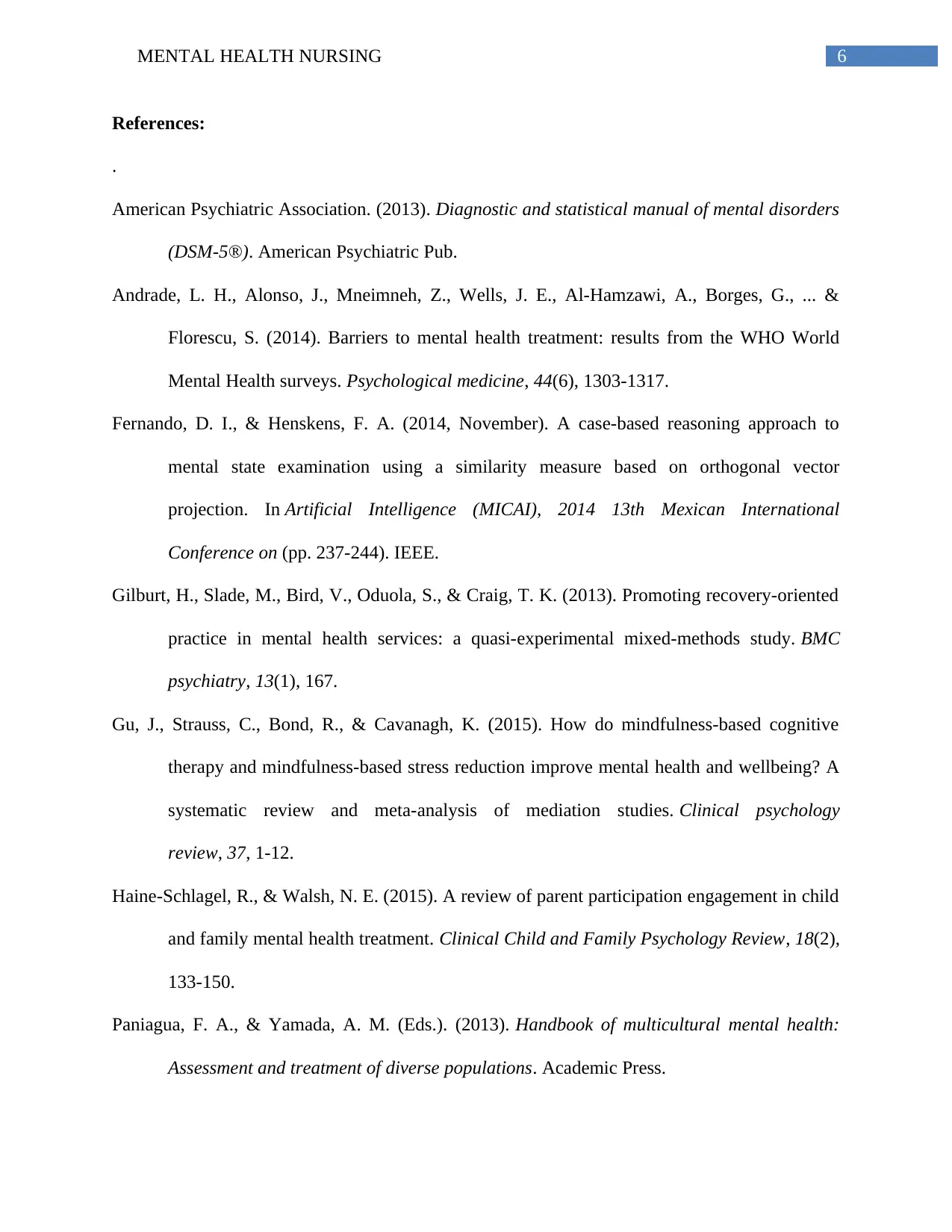
6MENTAL HEALTH NURSING
References:
.
American Psychiatric Association. (2013). Diagnostic and statistical manual of mental disorders
(DSM-5®). American Psychiatric Pub.
Andrade, L. H., Alonso, J., Mneimneh, Z., Wells, J. E., Al-Hamzawi, A., Borges, G., ... &
Florescu, S. (2014). Barriers to mental health treatment: results from the WHO World
Mental Health surveys. Psychological medicine, 44(6), 1303-1317.
Fernando, D. I., & Henskens, F. A. (2014, November). A case-based reasoning approach to
mental state examination using a similarity measure based on orthogonal vector
projection. In Artificial Intelligence (MICAI), 2014 13th Mexican International
Conference on (pp. 237-244). IEEE.
Gilburt, H., Slade, M., Bird, V., Oduola, S., & Craig, T. K. (2013). Promoting recovery-oriented
practice in mental health services: a quasi-experimental mixed-methods study. BMC
psychiatry, 13(1), 167.
Gu, J., Strauss, C., Bond, R., & Cavanagh, K. (2015). How do mindfulness-based cognitive
therapy and mindfulness-based stress reduction improve mental health and wellbeing? A
systematic review and meta-analysis of mediation studies. Clinical psychology
review, 37, 1-12.
Haine-Schlagel, R., & Walsh, N. E. (2015). A review of parent participation engagement in child
and family mental health treatment. Clinical Child and Family Psychology Review, 18(2),
133-150.
Paniagua, F. A., & Yamada, A. M. (Eds.). (2013). Handbook of multicultural mental health:
Assessment and treatment of diverse populations. Academic Press.
References:
.
American Psychiatric Association. (2013). Diagnostic and statistical manual of mental disorders
(DSM-5®). American Psychiatric Pub.
Andrade, L. H., Alonso, J., Mneimneh, Z., Wells, J. E., Al-Hamzawi, A., Borges, G., ... &
Florescu, S. (2014). Barriers to mental health treatment: results from the WHO World
Mental Health surveys. Psychological medicine, 44(6), 1303-1317.
Fernando, D. I., & Henskens, F. A. (2014, November). A case-based reasoning approach to
mental state examination using a similarity measure based on orthogonal vector
projection. In Artificial Intelligence (MICAI), 2014 13th Mexican International
Conference on (pp. 237-244). IEEE.
Gilburt, H., Slade, M., Bird, V., Oduola, S., & Craig, T. K. (2013). Promoting recovery-oriented
practice in mental health services: a quasi-experimental mixed-methods study. BMC
psychiatry, 13(1), 167.
Gu, J., Strauss, C., Bond, R., & Cavanagh, K. (2015). How do mindfulness-based cognitive
therapy and mindfulness-based stress reduction improve mental health and wellbeing? A
systematic review and meta-analysis of mediation studies. Clinical psychology
review, 37, 1-12.
Haine-Schlagel, R., & Walsh, N. E. (2015). A review of parent participation engagement in child
and family mental health treatment. Clinical Child and Family Psychology Review, 18(2),
133-150.
Paniagua, F. A., & Yamada, A. M. (Eds.). (2013). Handbook of multicultural mental health:
Assessment and treatment of diverse populations. Academic Press.
Paraphrase This Document
Need a fresh take? Get an instant paraphrase of this document with our AI Paraphraser
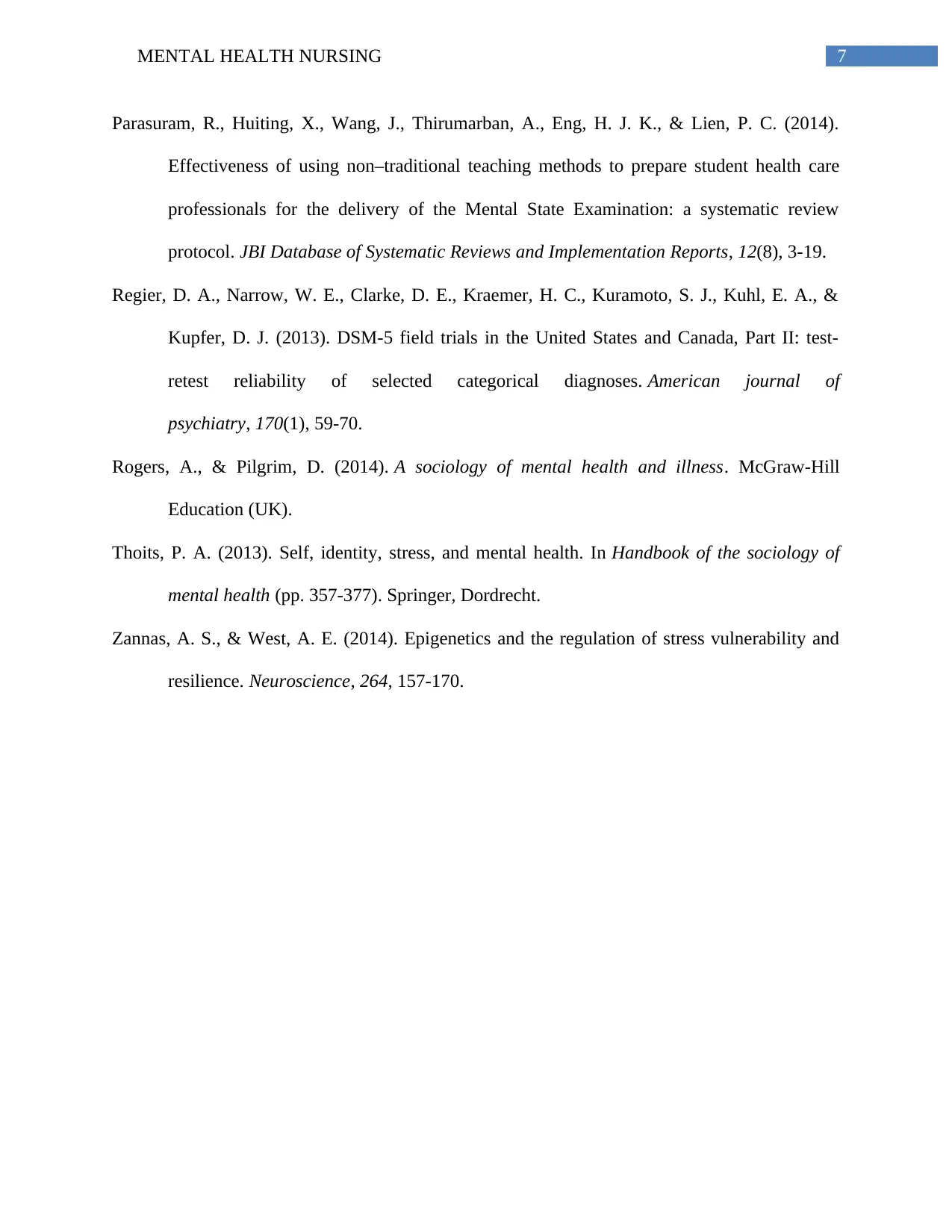
7MENTAL HEALTH NURSING
Parasuram, R., Huiting, X., Wang, J., Thirumarban, A., Eng, H. J. K., & Lien, P. C. (2014).
Effectiveness of using non–traditional teaching methods to prepare student health care
professionals for the delivery of the Mental State Examination: a systematic review
protocol. JBI Database of Systematic Reviews and Implementation Reports, 12(8), 3-19.
Regier, D. A., Narrow, W. E., Clarke, D. E., Kraemer, H. C., Kuramoto, S. J., Kuhl, E. A., &
Kupfer, D. J. (2013). DSM-5 field trials in the United States and Canada, Part II: test-
retest reliability of selected categorical diagnoses. American journal of
psychiatry, 170(1), 59-70.
Rogers, A., & Pilgrim, D. (2014). A sociology of mental health and illness. McGraw-Hill
Education (UK).
Thoits, P. A. (2013). Self, identity, stress, and mental health. In Handbook of the sociology of
mental health (pp. 357-377). Springer, Dordrecht.
Zannas, A. S., & West, A. E. (2014). Epigenetics and the regulation of stress vulnerability and
resilience. Neuroscience, 264, 157-170.
Parasuram, R., Huiting, X., Wang, J., Thirumarban, A., Eng, H. J. K., & Lien, P. C. (2014).
Effectiveness of using non–traditional teaching methods to prepare student health care
professionals for the delivery of the Mental State Examination: a systematic review
protocol. JBI Database of Systematic Reviews and Implementation Reports, 12(8), 3-19.
Regier, D. A., Narrow, W. E., Clarke, D. E., Kraemer, H. C., Kuramoto, S. J., Kuhl, E. A., &
Kupfer, D. J. (2013). DSM-5 field trials in the United States and Canada, Part II: test-
retest reliability of selected categorical diagnoses. American journal of
psychiatry, 170(1), 59-70.
Rogers, A., & Pilgrim, D. (2014). A sociology of mental health and illness. McGraw-Hill
Education (UK).
Thoits, P. A. (2013). Self, identity, stress, and mental health. In Handbook of the sociology of
mental health (pp. 357-377). Springer, Dordrecht.
Zannas, A. S., & West, A. E. (2014). Epigenetics and the regulation of stress vulnerability and
resilience. Neuroscience, 264, 157-170.
1 out of 8
Related Documents
Your All-in-One AI-Powered Toolkit for Academic Success.
+13062052269
info@desklib.com
Available 24*7 on WhatsApp / Email
![[object Object]](/_next/static/media/star-bottom.7253800d.svg)
Unlock your academic potential
Copyright © 2020–2026 A2Z Services. All Rights Reserved. Developed and managed by ZUCOL.




